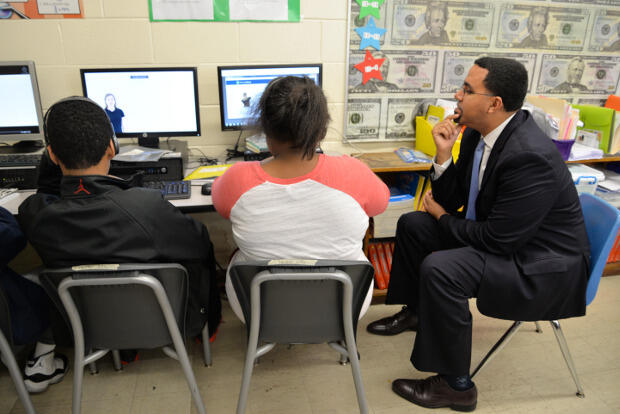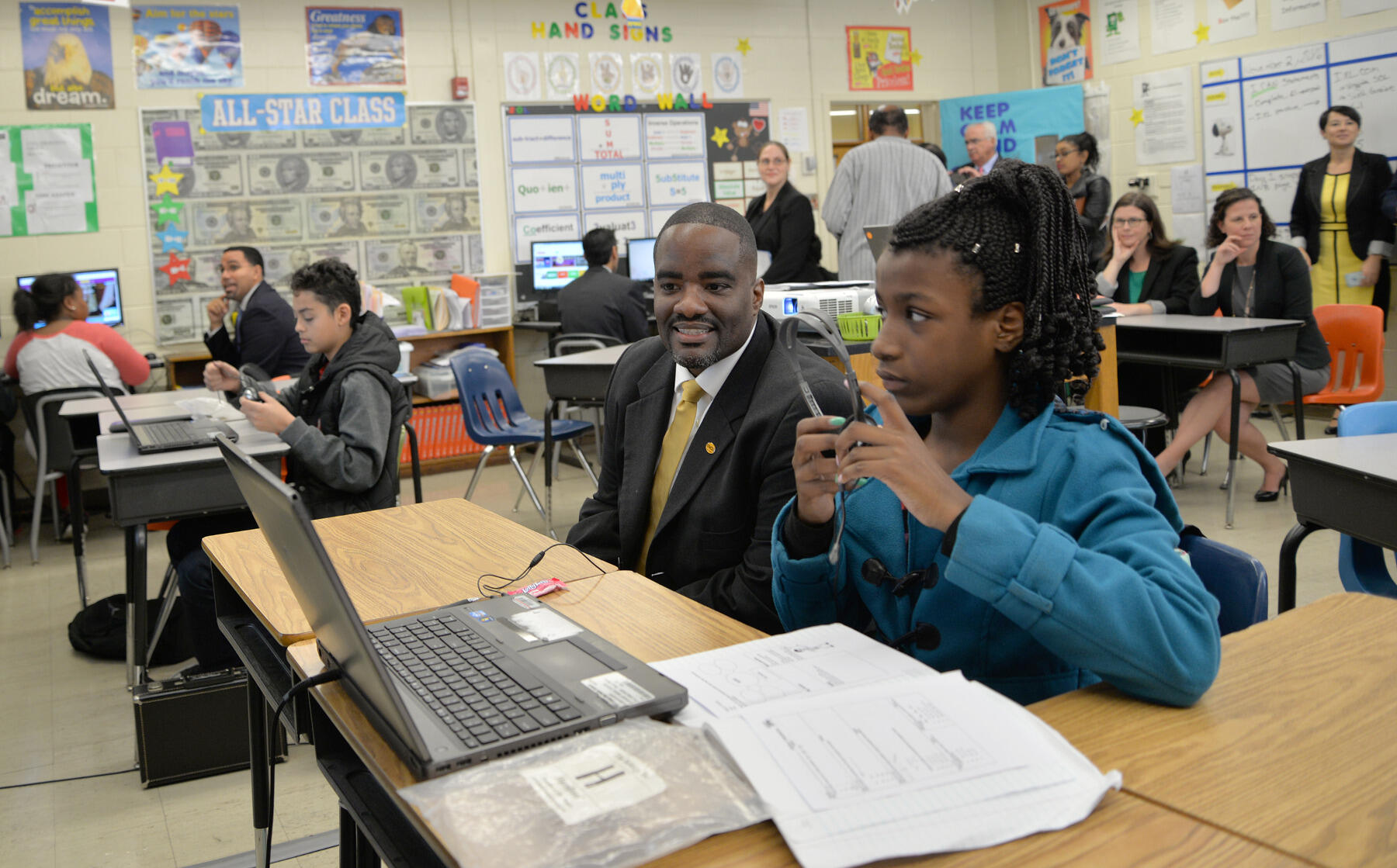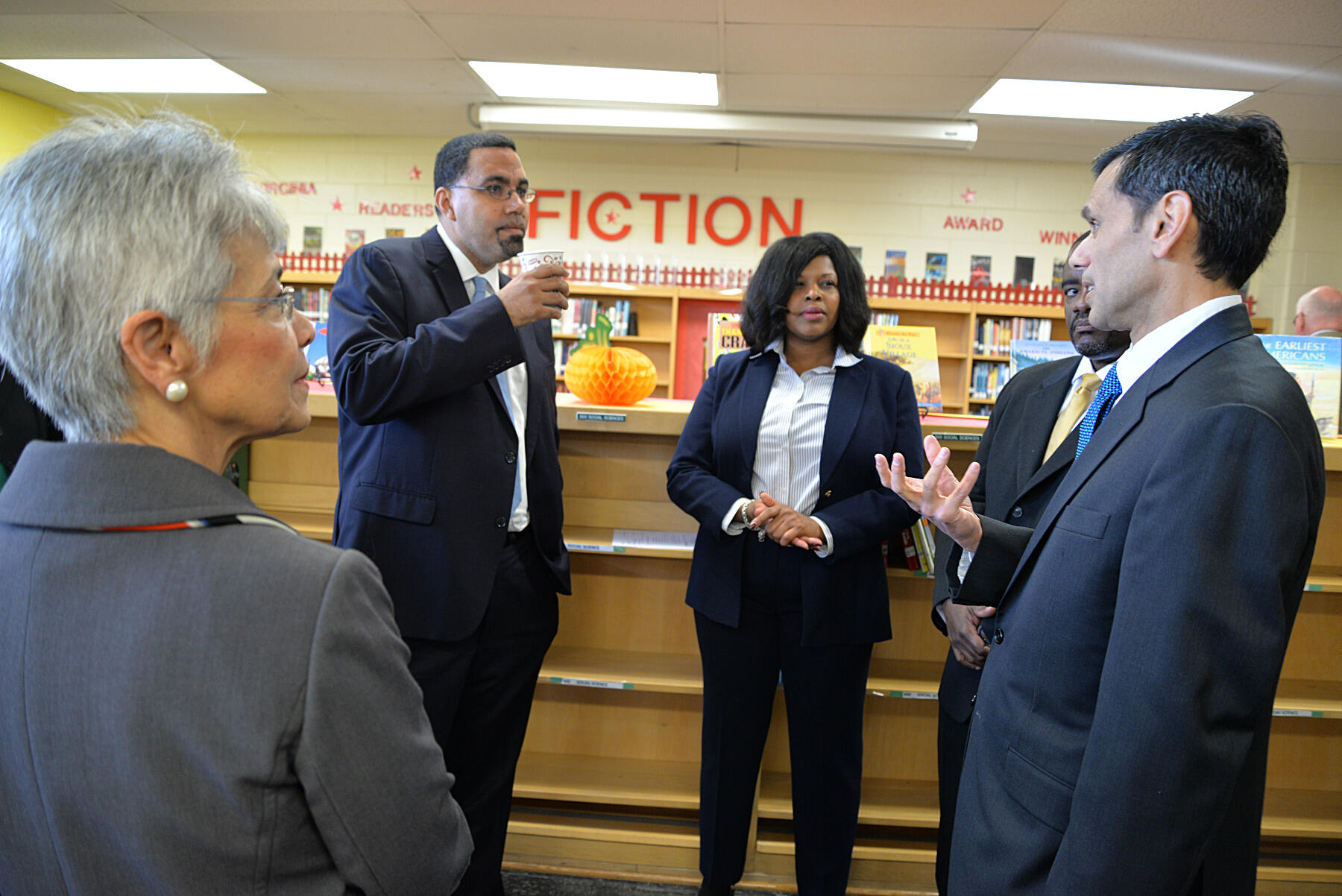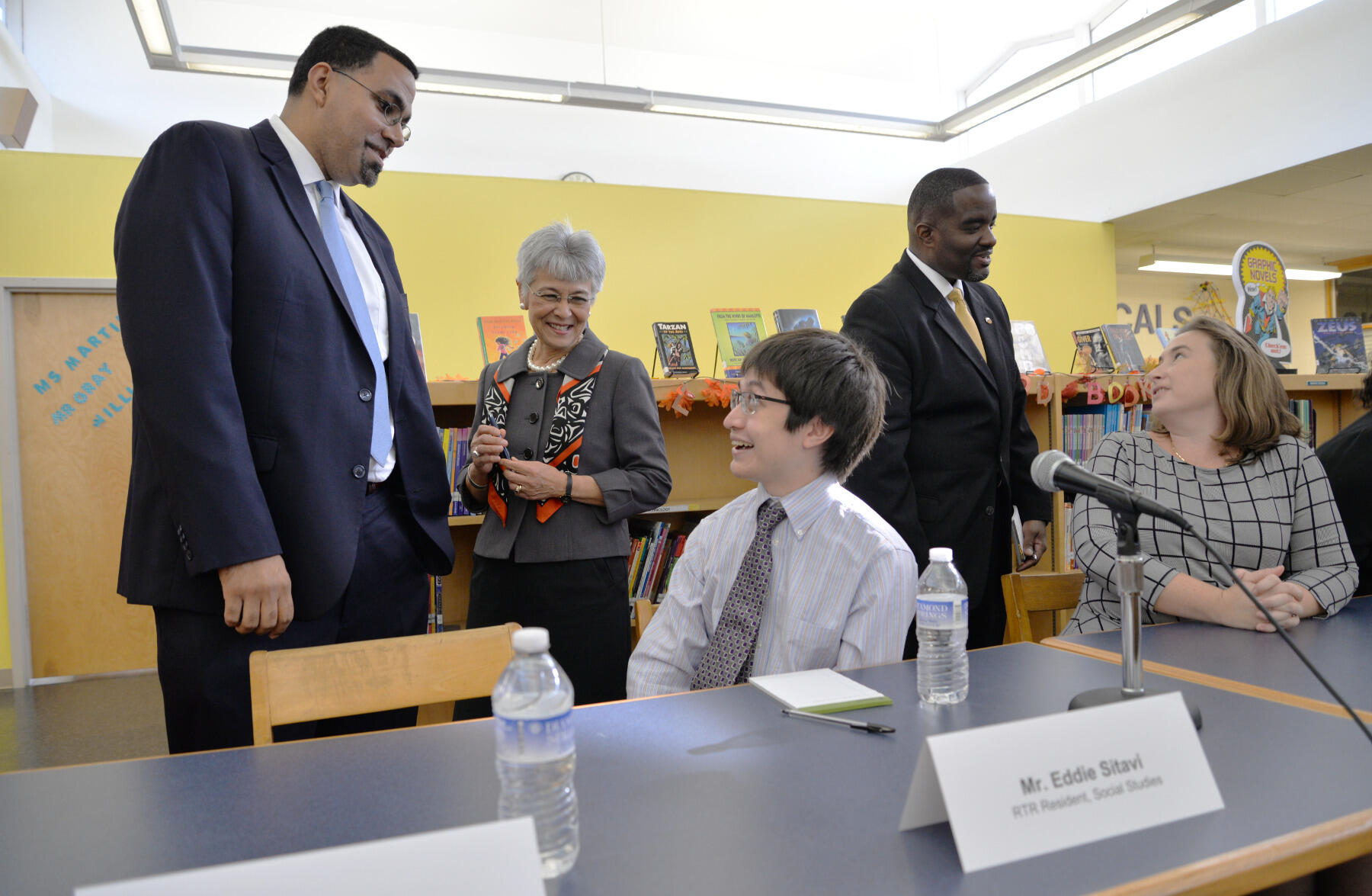
Nov. 2, 2016
U.S. Secretary of Education gets firsthand look at Richmond Teacher Residency program
The program is a partnership between Richmond Public Schools and VCU’s School of Education
Share this story
Sixth graders at Elkhardt-Thompson Middle School puzzled over a problem in their math class on Wednesday.
“Mario simplified 4/28 to 4/7,” they were asked. “Explain if he is correct or incorrect.”
“Just go with your gut,” advised one of their teachers, Dana Lockhart, as the students’ answers rolled in from their computers. “OK, so far, it looks like everybody’s right on track.”
Lockhart is teaching math this fall as part of the Richmond Teacher Residency program, a partnership between Richmond Public Schools and the Virginia Commonwealth University School of Education. It is a highly competitive graduate teacher residency program that recruits, prepares and supports teachers, preparing them to meet the distinct challenges of urban school systems and to make an immediate impact in Richmond Public Schools classrooms.
Sitting among the students in Lockhart’s class Wednesday was U.S. Secretary of Education John B. King Jr., who was visiting the school to see the program in action.

King said the Richmond Teacher Residency program is a great example of the kind of teacher preparation needed to meet the challenges facing urban school districts across the country. He also praised VCU and Richmond Public Schools for their collaboration, saying it served as a national model.
“Thank you for your leadership and realizing the importance of the partnership between higher ed and K12,” King said. “As we look across the country, many of the challenges that we face in schools can be best solved in partnership with higher education. And the commitment of VCU to the Richmond schools is noteworthy and an important model.”
After observing the math class taught by Lockhart and teacher mentor Donovan Tucker, King took part in an informal discussion with VCU President Michael Rao, Ph.D.; VCU School of Education Dean Andrew P. Daire, Ph.D.; and Richmond Public Schools Associate Superintendent of Academic Services Andrea Kane, Ed.D.; as well as a number of Richmond Teacher Residency teachers, graduates, mentors and career coaches.
Lemmy Okonta, a Richmond Teacher Residency graduate, said the program helped him not only gain experience with teaching, but also with building a rapport with his students.
“[Often] these kids don’t have a support system. You are their support system. That was the biggest thing that I learned in my first year with RTR — how to be an educator, and also balance that with being seen as a father figure or being seen as an older brother,” he said.
At the same time, Okonta said, the program provided him with a support system, as well.
“I had the whole RTR family to be able to help me get through, balancing my master’s classes, as well as to become more than an adequate teacher in the classroom, but to become an exceptional teacher in the classroom,” he said.
This program gave me that opportunity to just dive in.
Lockhart told King that she chose to take part in the Richmond Teacher Residency program because while she knew the content, she was enthusiastic and she had the calling to be a teacher, she lacked experience with the practical aspects of teaching.
“How am I going to teach all these kids? How am I actually going to get all this knowledge across to these kids so that they actually retain it and learn it and are engaged? This program gave me that opportunity to just dive in,” she said.
“You can make a lesson plan for class, but is it realistic? Is that activity really going to only take five minutes? What does your transition look like? What are the different methods? What are the different words that I should be using?” she said. “This program has provided me with all these tools. And every single day I’m able to reflect and say, ‘OK, I need to work on my classroom management.’ Or, ‘OK, I’m not using the right words when I’m teaching fractions. Nobody can understand me. How can I fix this?’”
King’s visit came not long after the U.S. Department of Education published regulations to help strengthen teacher preparation by ensuring that new teachers are ready to succeed in the classroom and that every student is taught by a great educator. The regulations aim to bring transparency to the effectiveness of teacher preparation programs, provide programs with ongoing feedback to help them improve continuously, and respond to educators across the country who do not feel ready to enter the classroom after graduation.
“We’re very conscious of our challenges — the challenges that you all face, the challenges faced by our low-income students, our English learners, our students with disabilities,” King said. “We’re very conscious of the fact that still today, affluent students are six times more likely to earn a bachelor’s degree by 24 than low-income students. We have work to do to make sure that our education system delivers on the promise of equality of opportunity. And we know teachers are central to that.”
He added that we must celebrate the work that teachers do every day, support clinically-rich teacher preparation programs — such as the Richmond Teacher Residency program — and ensure that teachers have access to support early in their career, as well as opportunities to grow through professional development and leadership opportunities.

Rao called the Richmond Teacher Residency program a success story, and one that is particularly meaningful as it bridges VCU with the community.
“But I also think it’s important because it’s meaningful to the students with whom we engage,” he said. “Our students now really want to be a part of significantly building their community. They want to know that their lives, what they’re doing, will positively impact the lives of young people and the community in general.”
Rao added that the program is meaningful to the children of Richmond, as well.
“It’s meaningful to a lot of children with tremendous potential. They are creative, they are thoughtful — as you just had an opportunity to see — and they’re … in an urban environment in the United States of America. They deserve to have a pathway to be as successful as they can be, and to become leaders — particularly in a community where we need leaders who embrace all diversity,” he said. “What you saw [in the classroom] is a level of enthusiasm that we all share, a level of enthusiasm … to take these bright minds in these schools and turn them into the successes that we know they can be.”
Therese A. Dozier, Ed.D., director of the Richmond Teacher Residency program, introduced King at Wednesday’s event, saying that he has been a “tireless advocate for equity and excellence throughout his career” with a deep respect and sense of gratitude for teachers.
Dozier noted that King served as an intern during her tenure at the U.S. Department of Education during the Clinton Administration, engaging in the department’s teacher leadership work, as well as an initiative to ensure a talented, well prepared and dedicated teacher were in every classroom.
“So, Secretary King,” she said, “I am pleased to introduce you to some of the most talented, dedicated and well prepared teachers and teacher leaders in Richmond Public Schools and they are our RTR graduates, residents, their clinical resident coaches, and we also have our career coaches who directly support our graduates for the first two years as teachers of record, and several of our principals who have both residents and graduates in their classrooms.”
King said that Dozier has “been a hero for a long time.”
“The internship I had with Terry really let me see the connection between policy and the classroom,” he said. “It was the summer after my first year of teaching. And it was an opportunity to see how dedicated public servants could use the power of the federal government to make things better for teachers in every classroom in the country.”

Subscribe for free to the weekly VCU News email newsletter at http://newsletter.news.vcu.edu/ and receive a selection of stories, videos, photos, news clips and event listings in your inbox every Thursday.
Subscribe to VCU News
Subscribe to VCU News at newsletter.vcu.edu and receive a selection of stories, videos, photos, news clips and event listings in your inbox.












